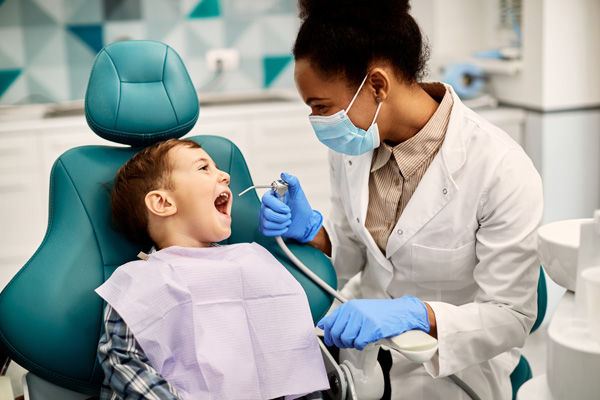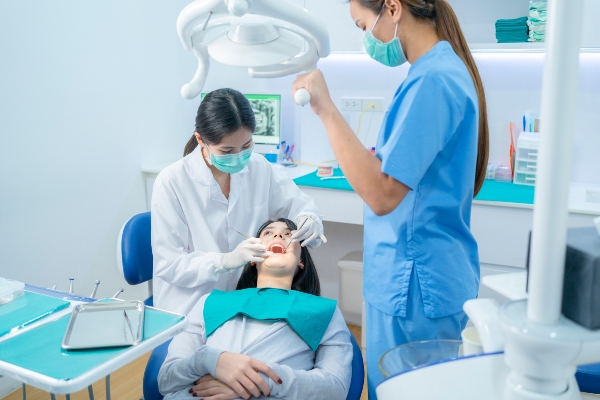 Pediatric dentists may use sedation to put children at ease during dental procedures. These dentists have the training and certification to administer anesthetics and sedatives. They can use measures like mild sedatives to keep your child calm and comfortable during treatment.
Pediatric dentists may use sedation to put children at ease during dental procedures. These dentists have the training and certification to administer anesthetics and sedatives. They can use measures like mild sedatives to keep your child calm and comfortable during treatment.
Tools like safe sedation enable a kids’ dentist to create a positive experience for your child. This goes a long way toward minimizing the chance that your child will grow up to fear the dentist. Keep reading to learn how and when kids’ dentists use sedation dentistry.
Reasons that a pediatric dentist will use sedation dentistry
Pediatric dentists should have a way with children, and they should have the skills to get the child through a dental procedure. These skills include the ability to adjust to a child’s mood, personality, and behavior.
Children’s dentists pursue extra training to acquire the tools and techniques that help them to treat young children. One technique is creating an inviting space that puts young kids at ease when they arrive at the office. Another is helpful, child-friendly support staff who can cater to a child’s unique needs. Also, the treatment room should have a calming ambience and custom fittings for child patients. Sedation dentistry is a tool that comes into play for:
- Young patients who experience fear and anxiety at the dentist’s
- Patients with special needs
- Children who are unable to sit still
- A young patient who needs to undergo lengthy, intensive procedures
- Young patients with a strong gag reflex
The following sections detail the different levels of sedation and their uses. Do note that sedatives complement anesthetics, not replace them. Once the dentist sedates the child, they will administer an anesthetic before starting a dental procedure.
Nitrous oxide for mild sedation
Laughing gas (nitrous oxide) is a mild sedative that keeps a child calm during a minor dental procedure. Dentists administer the gas by placing a mask over the patient’s mouth and nose. They will keep administering the gas at intervals for the duration of the procedure.
Nitrous oxide takes five minutes to kick in, and it quickly wears off. It is safe to use on children of all ages. Parents should limit their child to a light meal in the hours leading up to a dental procedure that involves nitrous oxide.
Oral sedation
Oral sedatives can take the form of a pill or in rare cases, a nasal spray. This type of sedation is ideal for a child with severe anxiety and is medically cleared for the drug. Unlike nitrous oxide, oral sedatives make the child drowsy, and this reduction in consciousness keeps the child calm. Oral sedatives take about 20 minutes to kick in, and they work best on an empty stomach for safety reasons.
A pediatric dentist will advise caregivers to have the child on a fast for at least eight hours before sedation. The dentist will typically schedule the procedure in the morning so the child can fast overnight.
IV sedation
IV sedation requires administering a sedative directly into a patient’s vein, rendering the person unconscious for the most part. This type of sedation is typically only necessary when the patient needs a lengthy, intensive procedure.
Dentists give strict, detailed instructions on how to prepare the patient in the hours leading up to sedation. They will also provide after-care instructions that help parents care for their child as the drugs wear off.
Drama-free dental care for young children is a reality
We have a pediatric dentist who can perform uneventful dental procedures for young patients. Reach our offices to find out how they can help your child maintain a healthy smile.
Request an appointment or call Hudson Valley Pediatric Dentistry at 845-363-4177 for an appointment in our Middletown office.
Recent Posts
Cavity treatment for kids is essential for a child’s oral health. Dental decay can cause discomfort, causing the child to lose focus at school. It can even result in low self-esteem and malnutrition. Treating cavities can improve your child’s general health. Here are effective techniques for cavity treatment for kids.There are cases when fillings cannot…
Parents play a crucial role in their children's tooth care by ensuring their children get started on the right path to optimal dental health. This involves overseeing children's tooth care at home while also helping them develop healthy dental habits and ensuring they see a pediatric dentist regularly.Parents will need to keep their child's mouth…
Just like adults, children need preventive dental care — that is where pediatric dentistry comes in. Many parents believe that their child's teeth are healthy simply because their child is young. The truth is that oral health issues are as prevalent in kids as much as adults. Since they love sugary treats, the risk of…


